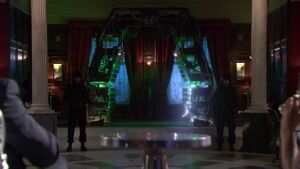Immortality Gate
The Immortality Gate was a complex device of Vinvocci design and was created with the purpose of serving as a medical device intended to heal wounds. It was a large machine requiring a great deal of power but was capable of mending entire planets through the use of a genetic template to broadcast across the population.
A Vinvocci vessel at some point crash landed on Earth at Mount Snowdon where it was recovered by Torchwood Institute forces who kept it contained in a vault for study. However, the fall of Torchwood led to Joshua Naismith acquiring the device in order to learn its secrets. He eventually determined its function as a device capable of healing the body but lacked the means to bring it operational and thus assigned scientists for the goal as their benefactor intended to use the Immortality Gate to make his daughter Abigail immortal. Unknown to them, two of the scientists within their team were Vinvocci, who had recieved a distress signal from the Immortality Gate and intended to repair it after which they would return it to their ship.
The Human group attempting to fix the Immortality Gate eventually discovered the return of Harold Saxon who they knew was an alien being of some sort (The Master) and intended to use him to repair it. He complied but intended to use the device for himself as the restored device was used to pass on his biodata onto every Human on the planet thus turning them all into versions of the Master.
The Gate was later used as a "tether", to pull Gallifrey out of the Time War. However, the Doctor shot the main componant of the transfer (a Whitepoint Star) with Wilfred Mott's gun, destroying the link. It's unknown what happened to the Gate afterwards, but as its power source was destroyed, it is likely to be at the very least inoperable. (DW: The End of Time)
"Immortality Gate" is most likely the name given to the device by Naismith. The Vinvocci never referred to it as such, but they never stated its true title, either. It is unknown whether it could actually grant immortality to a subject.

